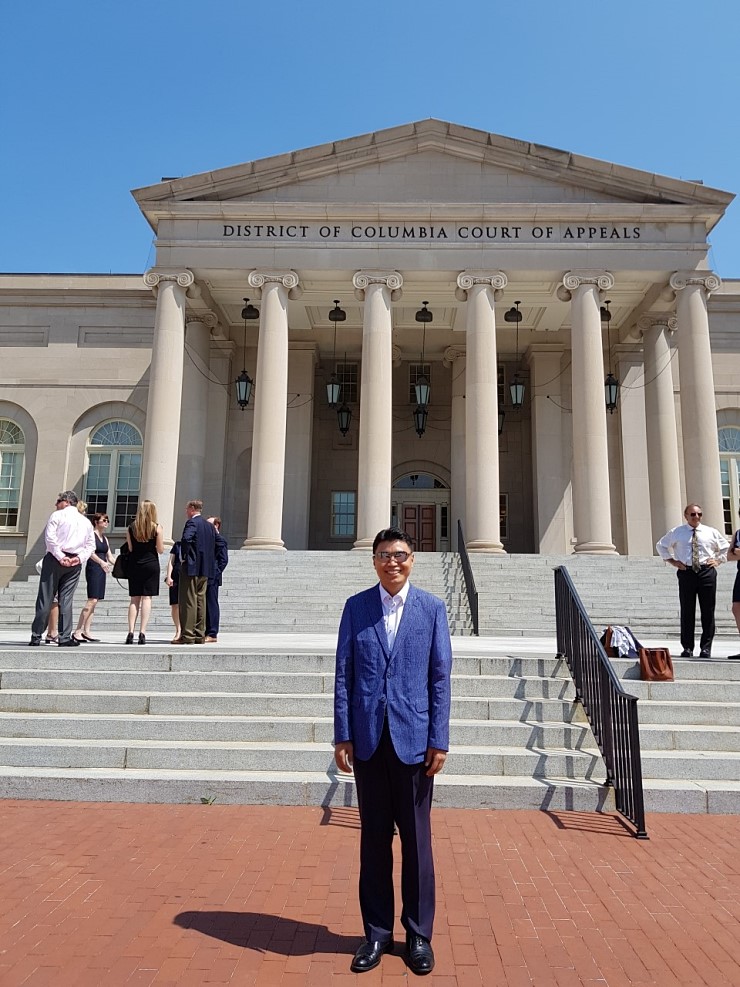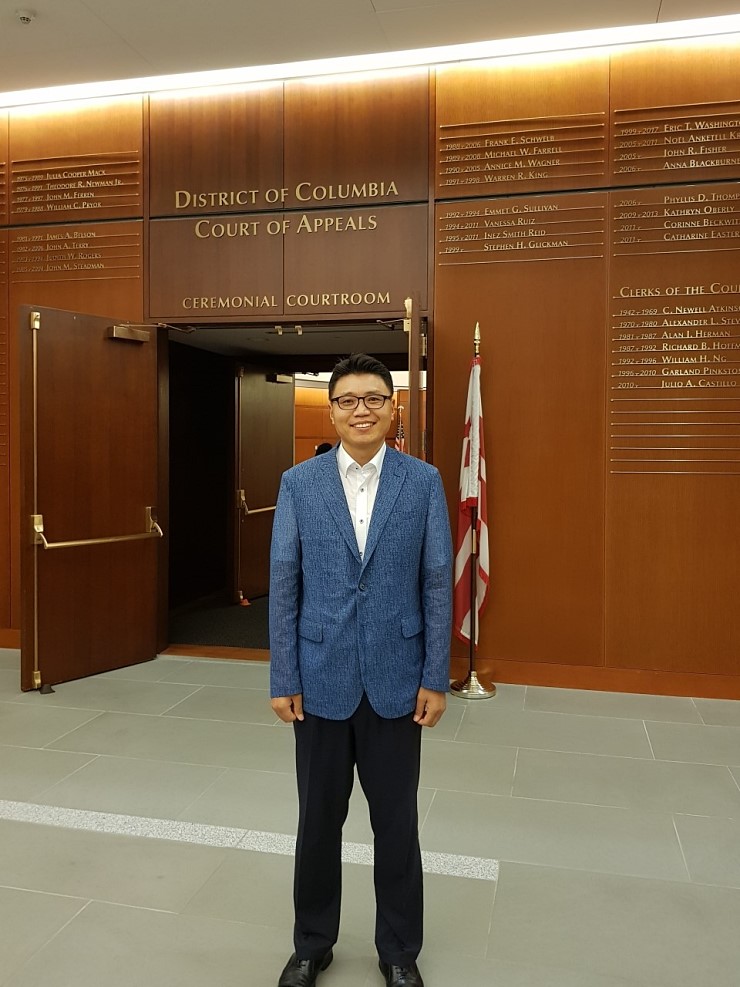It is a very difficult decision to challenge yourself beyond your expertise, especially for those who already have well established lifelong careers. However, Choi Chang-Hwan, professor in the Dept. of International Trade at Dankook University (DKU) recently passed the American Legal Ethics Examination and earned the status of a lawyer in the United States. In August 2017, Professor Choi received a master’s degree from Indiana State Law School after completing a grueling 1-year intensive program. Currently, he is promoting international development assistance (ODA) projects, training FTA experts, supporting the Ministry of Strategy and Finance’s understanding of international development cooperation with KOICA support. It is the first time a Korean university professor studied all subjects of the bar exam over a 1 year period and is even more remarkable for a Professor of international trade with no prior background in the field To learn more about Professor Choi Chang-Hwan, The Dankook Herald held an extensive interview with him earlier this month.
 |
| ▲ This is the photo that professor takes his oath as a lawyer in the U.S court. |
Q: Are there any specific reasons you decided to challenge yourself with studying law in the US?
A: I wanted to broaden my academic horizon for the research year. While teaching about international trade and trade theory, I studied American law, so that I could provide a more in-depth explanation of the laws governing economic trade theory and, international trade law. I also wanted to help foster the development of DKU students, so they too can actively advance on the international stage.
Q: What do you think are the main advantages of being a lawyer while being a professor of International Trade?
A: I want to boost our students’ international trade knowledge through interactions and discussions from various perspectives. These days it is not enough to develop knowledge from a singular perspective. We need people with multi-disciplinary approaches who can connect ideas from a variety of fields. Moreover, if students want to successfully understand international trade, it is very important to understand not only theories in the textbooks about international trade but also the crucial content of international trade laws. As trade-related problems continue to arise people who better understand the flow of world trade have become more valuable. By applying the law to international trade theory. I can offer students a greater perspective.
Q: What are some US laws you would like to introduce to students at DKU?
A: I would like to introduce two US laws to the students of DKU. First is Article 232 of the U.S. Trade Expansion Act. This law allows imports to be restricted by a high tariff if they are a direct threat to US economic security. For example, if it judged that the US industry will suffer due to market erosion by foreign companies, the US government can restrict imports by imposing high tariffs on the offending goods.
The second American law I would like to introduce is Article 301 of the US Trade Act. It states that goods that violate intellectual property rights, such as changing the name of a brand to produce replicas or fake goods are illegal imports. Under the original World Trade Organization (WTO) system, tariffs imposed should not be less than 2.5%. The Trump administration has provided legal grounds for invoking these laws setting a trade war between the United States and China.
Q: Can you give us one or two tips on how someone can prepare effectively for a US law exam in one year?
A: It was not easy for me to study a field outside my major, and complete it successfully in one year. I had to commit to using my time wisely. I studied from 7am to 9pm every day with an only 1-hour break. I made this plan on the first day and repeated it every day because I knew I had little time to complete the program. Because of my teaching experience, I was able to think about the composition of the textbook or examinations from the perspective of the examiner. I try to emphasize this to my students too. You can go through a textbook emphasizing the importance of the table of contents and memorize it completely in your head over a short period of time. So for our students, I am 48 years old and I did it within a year, so you should have no trouble doing it at 21 years old. If you work hard in class, you can become a customs officer like me. If I can do it, why can’t you? With this in mind, the Department of Trade can develop a large number of customs agents.
 |
Q: What was the most important thing you need to know when preparing for the American law exam?
A: Since the test requirements are very demanding, people who prepare need to be thoroughly evaluated. In order to obtain the qualifications for the American law exam, I graduated from the Dept. of Law at Indiana University 2 years ago. Fortunately, I also passed the American Legal Ethics Examination (MPRE) for the master course and was able to complete 30 credits in the master’s program (LLM) within 1 year. Normally, Law students are required to complete at least 24 credits, but if there is no law course in the formal program, they must complete at least 30 credits to qualify for the bar exam. As the process of becoming a US attorney is difficult, thorough preparations are needed. If you want to acquire, you have to work really hard.
Q: What are your plans now that you are a qualified American lawyer with expertise in international trade and trading relationships?
A: There is a Trade Mission under the Ministry of Trade and Industry. It is an institution that determines the legal basis for blocking trade and judges the fairness of various trade agreements. Essentially, it is an organization that helps Korean enterprises deal with unfair trade practices with other countries and either imposes or blocks high import duties during the export process. So, this ‘Trade Mission’ is where I ultimately want to work. I’m now working as a Trustee for the Director of the Fair Trade Association and I hope this career can be helpful for my future. The ultimate thing I want to achieve is working to ensure Korean enterprises do not lose out to unfair practices of foreign nations.
Q: Any last advice for Dankookians (students of DKU)?
A: The most important thing I hope our students remember is taking chances and overcoming challenges is for the young’ You will understand this better as you grow older, but it will be too late if you haven’t already taken risks while you were young. I believe just being an example of someone who earned success at my age with a huge amount of work, can be a more effective lesson for students rather than illustrating it in words a hundred times. The point of Einstein's special theory of relativity is that people in a moving world go slower than people in a static world. I hope Dankookians become more creative at developing themselves rather than simply existing in a static state. Keep working towards your dreams and you will see results. Another thing I want to emphasize is to keep evolving. I used to cite this book during my class, Alfred North Whitehead’s The Function of Reason. There are two tendencies in life. The first one is that people decay as they grow older. And the second one is that people keep trying to renew themselves. The oldest tree lives about a thousand years, and the roots decay as time passes. Despite this, every spring the tree sprouts new leaves. Like trees, I hope you understand the need to continuously grow. Also, if there are any students who want to get US law certification, I will help them with test-taking tips, so that I can continue to contribute to Dankookians who want to reach the international stage.
박근후, 김동은, Jane Shak dankookherald@gmail.com

![[Campus Magnifier] Let's Surf the Library!](/news/photo/202404/12496_1765_4143.jpg) [Campus Magnifier] Let's Surf the Library!
[Campus Magnifier] Let's Surf the Library!
![[Campus Magnifier] Let's Surf the Library!](/news/thumbnail/202404/12496_1765_4143_v150.jpg)





